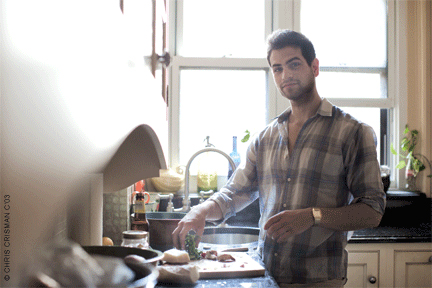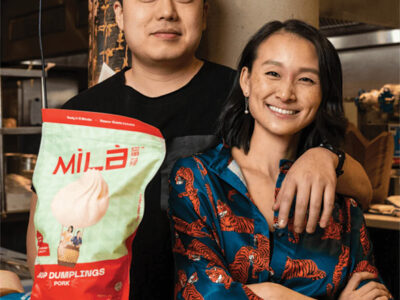
On Monday, May 16, Denzel Washington addressed Penn’s 255th graduating class beneath thick banks of clouds. Rather than a fallback plan, the Oscar winner spoke of falling forward. “At least this way I’ll see what I’m going to hit,” he said—advice pertinent to a pending political science and management graduate named Nate Adler C’11 W’11.
While his classmates contemplated what would follow this momentous day—Wall Street, grad school, rib eyes at Barclay Prime—Adler was saddled with small-business stress.
Before many of his contemporaries would even embark upon professional careers, he had already ridden the entrepreneurship parabola. Just four months earlier, he’d opened Kitchen at Penn, an independent-study project turned successful campus food-delivery service—and closed it 10 days before Commencement.
“We were always planning on closing for the summer,” Adler said in May, shortly after graduation and the expiration of Kitchen at Penn’s lease. “Our customer base is so transitive, so it was a smart business move. We have a good three months to figure it out.”
He estimated there was a “70 percent chance” Kitchen at Penn would reopen, in a new location, perhaps with table service, or as a food truck. By July, with sand running out in Kitchen at Penn’s hourglass and Adler in a management-training program with the Starr Restaurant Organization, the outlook was less sunny: “Reopening next year is not looking promising at all.”
“Nate was fun,” says Eric Clemons, a professor of operations and information management, of the student he mentored through the theoretical planning and eventual physical implementation of Kitchen at Penn. “He was spunky.”
It’s not an adjective that’s attached to Wharton students very often, a fact not lost on Clemons, who’s been teaching at Penn since 1976. “Entrepreneurship is a major, but increasingly our students don’t want to take the risk of starting a business,” he says. “Increasingly our students want to join a Wall Street firm and make vast amounts of money.”
Not Adler.
“[He] didn’t come here to learn algorithms or evaluations,” says Clemons. “He came here to learn about a business he loved. I wish all our students would come here with his passion.”
What Adler loves is the restaurant business. During summer of his junior year, the native New Yorker held a summer associate position at a Manhattan consulting firm. “I didn’t really have a good experience,” Adler remembers. “I was sitting in a cubicle doing menial work nine to ten hours a day. That’s when I realized I couldn’t be cooped up in an office environment all day.”
The money was good, though, and Adler spent a good chunk of it exploring the New York restaurant scene. “I would take a notebook and jot down what I thought—about the menus, the ambiance. I was trying to up my food knowledge of the restaurant business and understand what it takes to succeed.”
Adler brought his newfound knowhow back to campus last fall and sought out Clemons, from whom he’d previously taken a class. Clemons, a longtime food lover with his own barbecue blog, agreed to oversee the independent study. With a few other classmates, Kitchen at Penn took shape on paper. As the semester progressed, the group chiseled away at the umbrella goal, according to Clemons, of “feeding Penn undergrads, giving them more choices and better choices, and using information technology to deliver physical food to a physical address.”
As Adler puts it: “There was nowhere on campus to get fresh vegetables made to order. And that’s what we provided. It was mom’s cooking, kicked up a notch.”
Even when Kitchen at Penn was open, it didn’t seem like a going concern. Housed in a former church kitchen in a Springfield Avenue twin, the business was the definition of nondescript. There was a security grate drawn over the window, and a front door that blended into the facade like a chameleon into a tree branch. It looked more like a safe house for a drug-running crew than a humming dinner-to-dorm enterprise, one in which Adler and his partners invested $30,000 of their own capital at the start of spring semester.
But humming it was, with Google Checkout receipts taped to a long stainless steel worktable, fluttering in the breeze of the exhaust fan. Meatloaf! Mac and cheese! Banana pudding! Just like in a restaurant kitchen, orders were called and fired, packed up in carryout containers and sent on their way by bike messenger. Destination: Harrison. Destination: Hill. Destination: Quad.
The bread was baked on premises. The pasta was made from scratch. Local farms figured into the culinary equation, purveyors named and thanked on the user-friendly website just as they are at Philadelphia’s trendiest farm-to-table restaurants.
It was, by all accounts, a relevant and successful business. And there was a heartening precedent for a food-delivery outfit born in an enterprising student’s head and shaped by peers and faculty in a Wharton classroom. Another path-breaking Philadelphia food-delivery business had gotten its start the same way. Munish Narula WG’01 started Tiffin, a tandoor-to-door operation on a sketchy stretch of Girard Avenue, when he was an MBA candidate at Wharton. The Indian mini-chain now runs six locations in the city and suburbs, with an upscale spin-off, Tashan, slated to open soon on the Avenue of the Arts.
During a recent job interview, Adler was asked to name one of his greatest accomplishments. He talked about Kitchen at Penn.
“I was taking five classes and opened my own successful business,” he says now, recalling the interview, almost defending himself. “I have a dual degree from Penn.” But, he says, the interviewer “didn’t seem impressed.”
“I had this hubris that whatever job I applied to, I could probably get. People would realize that I really work hard.”
Spunk, it seems, only goes so far.
“I didn’t anticipate Kitchen at Penn was going to end the way it did,” says Adler. “But I think what it prepared me most for was realizing that I can create a successful business. If I don’t have a job that I’m excited about, then I can just go out into the world and make something happen.”
Adler has already found a new creative outlet, a “multisensory food blog” called the Walkin’ Kitchen. “[The blog] will combine artistic mediums to create a new way of reviewing food experiences, stimulating not only your taste buds, but other senses as well,” he says. For example: “Let’s say I go to a dank Cuban restaurant. The music contributor will do a Cuban music mixtape, we will do a story about a Cuban chef, and a comic about it.” He’s rallying the old Kitchen at Penn team for the new venture, too. “The drawing contributor will be the guy who did the [Kitchen at Penn] website, and the creative writing will be [by] the person who did the Kitchen at Penn blog.”
That, as they say, is the (entrepreneurial) sprit.
“There is a small number of Wharton students that are doing what Nate did—and what students in the ’50s and ’60s did,” says Clemons. “Combining coursework and theory to start a company. It’s a new generation of spunky students, and Wharton is their way to get there.”
In this way, the uncertain future of Kitchen at Penn is almost beside the point. The verve, creativity, and courage to start a small business, when the path of least resistance leads directly and lucratively to Wall Street, is accomplishment enough. Adler, however unintentionally, exemplifies a new breed of Wharton student.
And don’t count Kitchen at Penn totally out just yet.
“Shanghai,” says Clemons. “I think Nate would do really well there.”
—Adam Erace C’06




